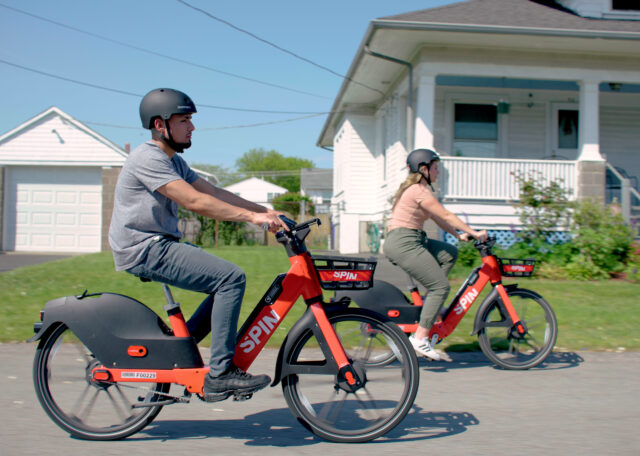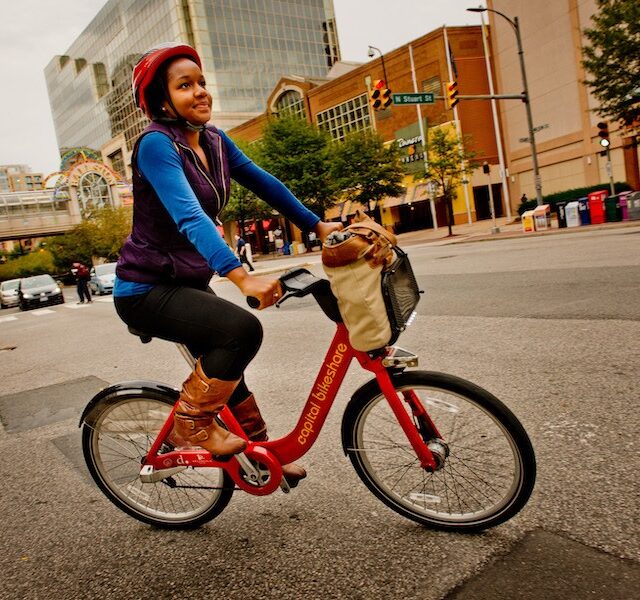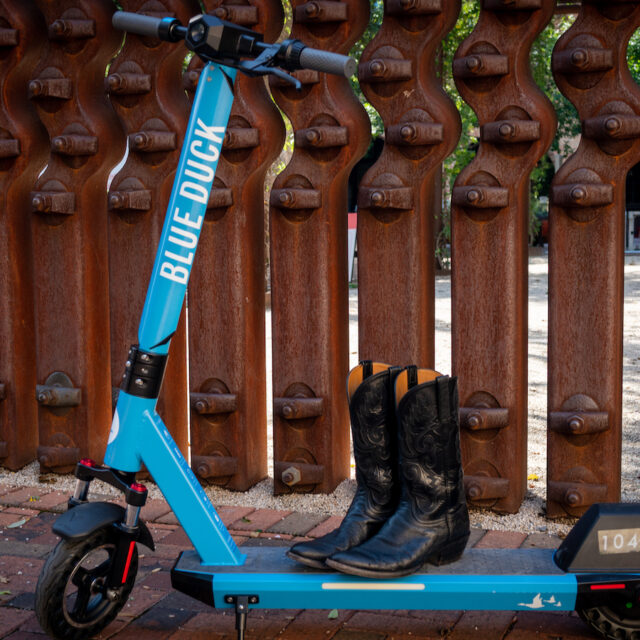Operationalizing Equity in Scooter and Bike Share
by Kiran Herbert, Communications Manager
September 21, 2021
Contractors have a crucial role to play when it comes to ensuring shared micromobility is accessible to everyone. Spin and Superpedestrian make commitments that count.

Left to their own devices, most corporations don’t center equity. After all, when you’re looking to scale quickly and driven by profit and appeasing shareholders, what’s the point of engaging poor or otherwise marginalized populations? It’s a problematic and short-sighted approach that is prevalent across industries, shared micromobility included.
In our realm, we often see contract companies that cluster services in wealthier, downtown neighborhoods or lack any sort of programming to break down known barriers to using bike or scooter share. BBSP exists to encourage more equitable practices but we often see nonprofit organizations and city governments taking on the bulk of this work versus the for-profit operators that dominate the shared micromobility scene. That’s changed somewhat in recent years, as national cries for social and racial justice have grown louder, but overall, equity is still seen as a “nice to have” versus a “must-have” operational pillar.
“I don’t know if there’s a more important topic facing shared micromobility right now,” says Paul White, senior director of public affairs at the transport robotics firm Superpedestrian. “Shared micromobility operates in the public right of way and only with the permission of cities—anything inclusive or unaffordable runs counter to city values. Doing right by equity requires a fundamental understanding that we’re not tech companies, we’re more like a public transportation service and therefore, we have a responsibility to serve everyone.”
For Superpedestrian, that means investing in one’s workforce as part of a long-term strategy, a way to establish a lasting business versus a billion-dollar IPO. The company, which operates Link e-scooters in 50 markets across North America and Europe, eschews gig workers in favor of W2 employees. At Spin, the scooter and bike share operator active in more than 70 markets around the globe, 90% of its fleet operations team have been in-house employees since 2019.
Kyle Rowe, Spin’s head of government partnerships, wrote about the decision to move away from gig work in an op-ed for Wired. Not only was it the right thing to do but it also made financial sense, a way to boost business, ensure higher retention rates and run a safer business. Spin also works with local organizations to achieve diversity in its hiring pools and recently began offering double referral bonuses for workers in any of its six employee resource groups (ERG), the end goal being a workforce that reflects the communities it serves.
From its inception in 2017, Spin has always had a basic low-income program—Spin Access—in order to ensure the community it serves is diverse. Likewise, at Superpedestrian, the company designed its scooters to work for everyone from an engineering standpoint—offering a Firefly scooter attachment for wheelchairs from Rio Mobility by request—as well as operate with a lower cost structure, allowing the company to offer LINK-Up, a reduced fare program that offers a minimum 70% off for qualifying riders. Offering a low-income program, however, is the least of what’s expected of operators from an equity standpoint.
“The next step that we took to think about equity in a meaningful way was to hire consultants,” says Kay Cheng, Spin’s head of streets and equity. “We used a human-centered design approach to understand the business in service of improving our offerings.”
In 2019, Spin hired Dr. Destiny Thomas, CEO and founder of Thrivance Group, and Marquita “Keta” Price, director of urban and regional planning at The East Oakland Collective, to lead an internal audit, complete with data analysis, community open houses, interviews and prototyping. By early 2020, Spin made its work public, identifying five key areas for improving mobility equity:
- Active Inclusion
Show respect for the local context and the diversity of riders. - Easy Enrollment
Make applying for discount programs as easy as possible. - Price Transparency
Make the cost of a scooter ride predictable and easy to understand. - Reliable Availability
Make scooters a reliable option by providing consistent vehicle coverage. - Low-tech Redundancies
Ensure that people with limited access to the internet, smartphones and credit cards are not left behind.
Spin’s website includes a downloadable brief, complete with guiding principles for achieving equity and a step-by-step guide for using a people-focused design approach to guide equity work.
“A lot of the cities we’re working with are also evolving and they don’t know where to start either, so we wanted to share out our learnings,” says Cheng, who used to work as a senior planner and urban designer for the city of San Francisco.
Cheng believes that, in a competitive environment, Spin’s equity work helps differentiate the company in its RFPs, the documents cities use to determine contracts. After all, there’s a business case to be made for companies that can successfully accommodate a diversity of riders.
“If we make the experience for our most vulnerable users better it will only help all riders,” says Cheng. “City regulators and operators are learning that we can improve just by tweaking our programs and actually listening to the people we want to serve.”
Spin recently surveyed all of its Access Riders—offering gift cards and ride credits—to identify the variety of reasons people use its service. The company plans on making the findings public but in the interim, Cheng shared some of the most interesting findings: More than a quarter of Access riders had no other form of transportation and 67% said some of their trips were to connect to public transit. Respondents also shared that they used Spin to connect to government services, jobs and schools.
“Getting this information is typically so hard to get but city and regional planners want it too,” says Cheng. “I love that we can now learn from our users and feed that back to the city and say, ‘Yes, people actually don’t have a car and are using our service’ or ‘Yes, these people are using scooters to connect to public transit.’”
Increasingly, cities are using “Equity Zones” to identify neighborhoods where certain demographics—people of color; lower household incomes; homes without access to a vehicle—indicate historically marginalized populations likely to benefit from shared micromobility and more infrastructure improvements. Spin calls these areas “Access Zones” and it’s begun automatically offering discounts for everyone who starts a trip in them.
“Some people don’t know about our low-income program despite marketing, so this is another way to advertise it,” says Cheng.
Similarly, White notes that Superpedestrian has positioned its company values to better align with cities, believing that serving a whole city means actively investing in communities and taking the initiative to recruit users to a company’s equity program. White points to the company’s recent L.A. launch, where workers were on the ground months before doing demo rides, familiarizing people to the service and enrolling qualified riders in the LinkUp program. He also notes that in all markets, local nonprofits and existing small businesses are valuable partners when it comes to marketing and outreach.
Recognizing that reduced fare programs do little in neighborhoods where infrastructure conducive to micromobility is lacking, Spin has taken its partnerships a step further in creating Spin Streets. The company maintains that giving money is one thing and tracking partnerships is another, the latter allowing for the identification of and funding for catalytic projects.
“We find those unique opportunities where we can come in and fund something,” says Cheng. “We’ll bring in a design consultant, or a design-build or clean-up crew — those have all been our thing.”
Spin will also fund community engagement on longer projects or create public mock-ups of designs, ensuring people know what they’re voting on and helping to generate buy-in. To date, the company has awarded around 30 grants as part of its Spin Streets program and at any given time, is in talks with 10-20 cities trying to prioritize projects. Spin also funds $1,000 Parking Day grants to support installations and tailored educational activities in its markets, seeing them as a gateway to tactical urbanism—low-cost, temporary changes to the built environment—which is of course a gateway to safer streets.
Spin also supports bike and pedestrian advocacy groups by arming them with data through its Mobility Data for Safer Streets program. The program, now in its second year, has allowed micromobility advocacy organizations to work on projects in underserved parts of their cities. Historically marginalized communities often lack representation in both the transportation planning process and available data, a fact that Spin is working to change by supplying data to back up advocates’ arguments.
“A lot of time advocates will say, ‘We want to make this a shared street’ or ‘we want to put a bike lane here,’ and the city asks for a traffic count or prove X, Y, Z thing,” says Cheng. “So we give them counters, we give them StreetLight data to help them advocate.”
Superpedestrian similarly partners with local advocacy groups to help document public support for certain changes using data or to close funding gaps. The company will also tap rider data when working with cities to identify priority zones or dangerous places in need of urgent infrastructure fixes.
“In an area where everyone is riding on the sidewalk, that’s often a survival strategy,” says White. “It’s our responsibility as micromobility operators to play a role in healing that injustice.”
The Better Bike Share Partnership is funded by The JPB Foundation as a collaboration between the City of Philadelphia, the National Association of City Transportation Officials (NACTO) and the PeopleForBikes Foundation to build equitable and replicable bike share systems. Follow us on Facebook, Twitter and Instagram or sign up for our weekly newsletter. Got a question or a story idea? Email kiran@peopleforbikes.org.



